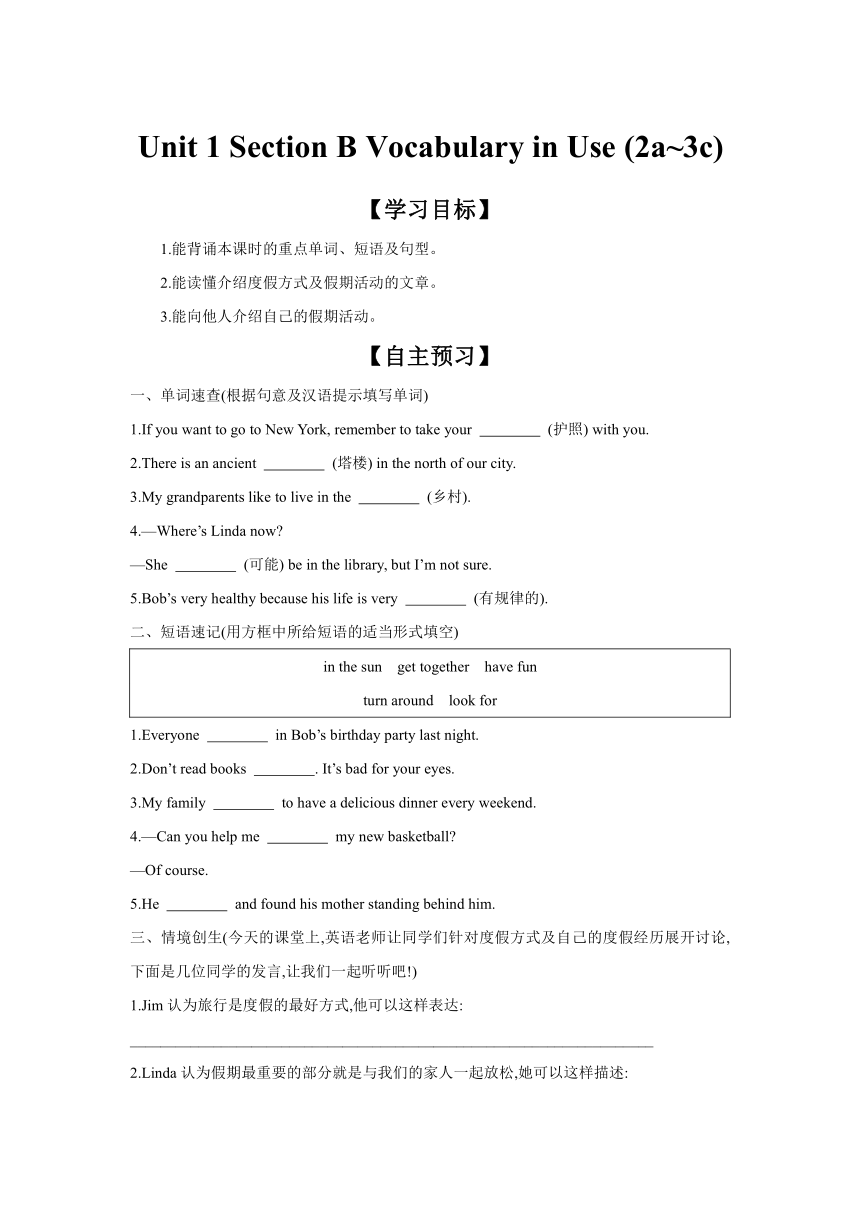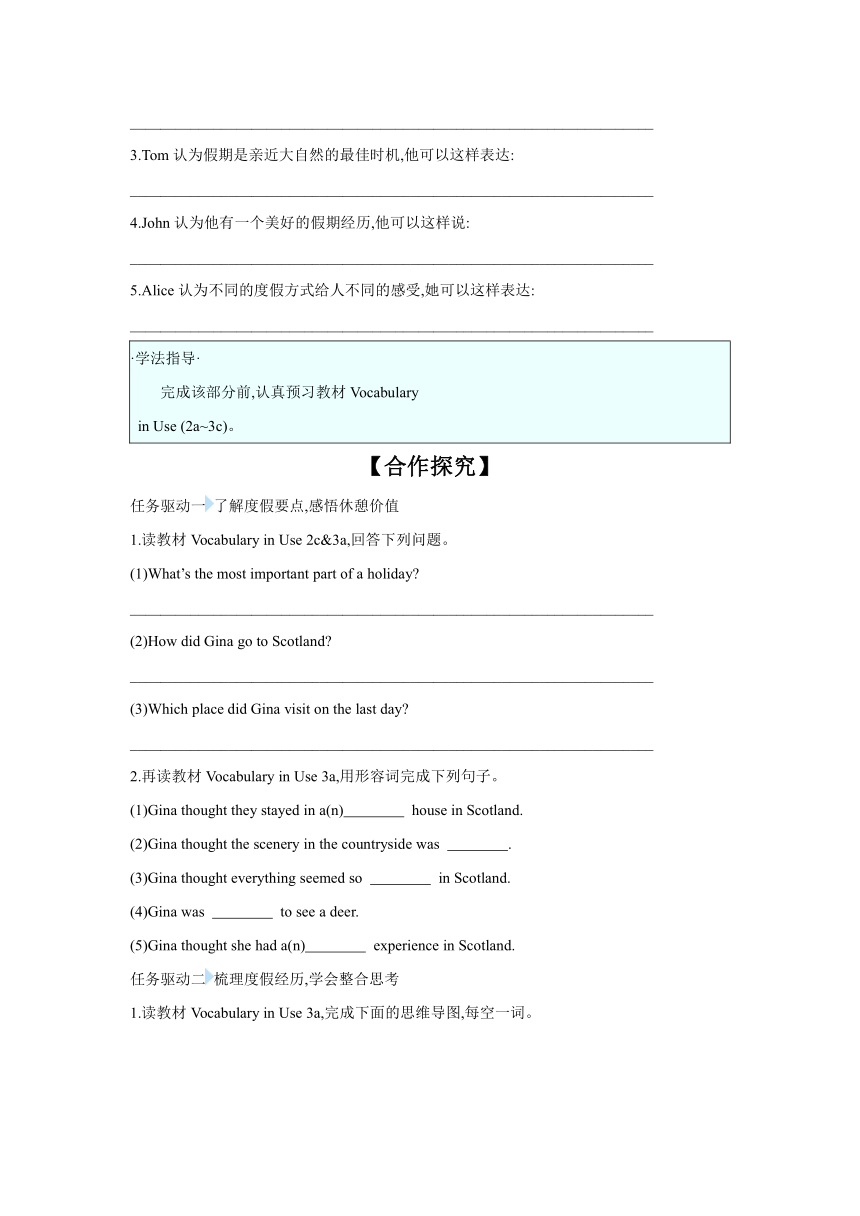【导学案】Unit 1 Happy Holiday Section B Vocabulary in Use (2a~3c)(含答案) 2025-2026学年英语人教版(2024)八年级上册
文档属性
| 名称 | 【导学案】Unit 1 Happy Holiday Section B Vocabulary in Use (2a~3c)(含答案) 2025-2026学年英语人教版(2024)八年级上册 |  | |
| 格式 | docx | ||
| 文件大小 | 89.0KB | ||
| 资源类型 | 教案 | ||
| 版本资源 | 人教版 | ||
| 科目 | 英语 | ||
| 更新时间 | 2025-08-16 22:09:35 | ||
图片预览


文档简介
Unit 1 Section B Vocabulary in Use (2a~3c)
【学习目标】
1.能背诵本课时的重点单词、短语及句型。
2.能读懂介绍度假方式及假期活动的文章。
3.能向他人介绍自己的假期活动。
【自主预习】
一、单词速查(根据句意及汉语提示填写单词)
1.If you want to go to New York, remember to take your (护照) with you.
2.There is an ancient (塔楼) in the north of our city.
3.My grandparents like to live in the (乡村).
4.—Where’s Linda now
—She (可能) be in the library, but I’m not sure.
5.Bob’s very healthy because his life is very (有规律的).
二、短语速记(用方框中所给短语的适当形式填空)
in the sun get together have fun
turn around look for
1.Everyone in Bob’s birthday party last night.
2.Don’t read books . It’s bad for your eyes.
3.My family to have a delicious dinner every weekend.
4.—Can you help me my new basketball
—Of course.
5.He and found his mother standing behind him.
三、情境创生(今天的课堂上,英语老师让同学们针对度假方式及自己的度假经历展开讨论,下面是几位同学的发言,让我们一起听听吧!)
1.Jim认为旅行是度假的最好方式,他可以这样表达:
_____________________________________________________________________
2.Linda认为假期最重要的部分就是与我们的家人一起放松,她可以这样描述:
_____________________________________________________________________
3.Tom认为假期是亲近大自然的最佳时机,他可以这样表达:
_____________________________________________________________________
4.John认为他有一个美好的假期经历,他可以这样说:
_____________________________________________________________________
5.Alice认为不同的度假方式给人不同的感受,她可以这样表达:
_____________________________________________________________________
·学法指导·
完成该部分前,认真预习教材Vocabulary
in Use (2a~3c)。
【合作探究】
任务驱动一了解度假要点,感悟休憩价值
1.读教材Vocabulary in Use 2c&3a,回答下列问题。
(1)What’s the most important part of a holiday
_____________________________________________________________________
(2)How did Gina go to Scotland
_____________________________________________________________________
(3)Which place did Gina visit on the last day
_____________________________________________________________________
2.再读教材Vocabulary in Use 3a,用形容词完成下列句子。
(1)Gina thought they stayed in a(n) house in Scotland.
(2)Gina thought the scenery in the countryside was .
(3)Gina thought everything seemed so in Scotland.
(4)Gina was to see a deer.
(5)Gina thought she had a(n) experience in Scotland.
任务驱动二梳理度假经历,学会整合思考
1.读教材Vocabulary in Use 3a,完成下面的思维导图,每空一词。
2.再读教材Vocabulary in Use 3a,根据语篇要求填空,使短文通顺、意思完整。每空限填一词。
Last autumn, my family took a train to Scotland for a holiday. We stayed in (1) comfortable house in the countryside with beautiful scenery. I live in a big city, so everything there seemed so different. For example, beside the house, (2) was a huge forest.
On the last day, early in (3) morning, I went to the forest to explore. While there, something made a noise. I turned around and was surprised (4) see a deer.
I ran home and told my parents (5) I saw. My mum smiled and said, “The deer is probably looking for food and hoping to get some from you.” What a wonderful experience I had! I really hope I can go back again.
任务驱动三模拟度假对话,践行合作分享
结合自身的度假经历,以小组为单位结对合作编写一段对话,小组之间互相进行点评,并将优秀对话拍成视频供学生学习。
对话参考句型:
A:How was your weekend
B:...
A:Where did you go for your holiday
B:...
A:Who did you go with
B:...
A:What did you do
B:...
A:What did you learn
B:...
A:How did you feel
B:...
【知识探究】
I’m getting a little forgetful these days. 这些天我有点健忘了。
用法总结 forgetful是形容词,意为“健忘的;好忘事的”,由“forget(v.忘记)+-ful(形容词后缀)”构成。例如:
My grandparents are very forgetful. 我的祖父母很健忘。
知识拓展 -ful是形容词后缀,常加在名词或动词后构成形容词,意为“充满……的;有……性质(或倾向)的”。例如:
help→helpful(有帮助的);care→careful(小心的);use→useful(有用的);beauty→beautiful(美丽的);colour→colourful(多彩的);peace→peaceful(和平的;宁静的);hope→hopeful(有希望的)。
素养训练 用括号内所给词的适当形式填空。
1.Linda often helps others, so she’s a (help) girl.
2.The (forget) boy often forgets to take his homework to school.
I turned around and was surprised to see a deer. 我转过身,惊讶地看到一只鹿。
用法总结 surprised作形容词,意为“惊奇的;惊讶的”。常见搭配:be surprised at sth对某事感到惊讶;be surprised to do sth做某事感到惊讶。例如:
I was surprised to see my old friend in the supermarket yesterday. 昨天在超市看到我的老朋友,我很惊讶。
知识拓展 辨析surprised和surprising
surprised 意为“惊奇的;惊讶的”,表示感到惊讶,常作表语,用来描述人的感受
surprising 意为“令人惊奇的”,可作定语或表语,常用来说明或描述事物
They are surprised at the surprising news.他们对这则令人惊奇的消息感到惊讶。
素养训练 用括号内所给词的适当形式填空。
1.We are (surprise) to see two deer running across the road.
2.It’s (surprise) that the girl made these lovely bears by herself.
【参考答案】
自主预习
一、
1.passport 2.tower 3.countryside 4.might/may 5.regular
二、
1.had fun 2.in the sun 3.get together
4.look for 5.turned around
三、
1.I think traveling is the best way to spend our holidays.
2.The most important part of a holiday is to relax with our family.
3.It’s the best time to stay close to nature.
4.What a wonderful holiday experience I had!
5.Spending holidays in different ways can bring us different feelings.
合作探究
任务驱动一
1.(1)To rest our mind and body.
(2)By train./She took a train there.
(3)The forest.
2.(1)comfortable (2)beautiful (3)different (4)surprised (5)wonderful
任务驱动二
1.(1)train (2)countryside (3)deer (4)ran (5)food
2.(1)a (2)there (3)the (4)to (5)what
知识探究
命题点一
素养训练
1.helpful 2.forgetful
命题点二
素养训练
1.surprised 2.surprising
【学习目标】
1.能背诵本课时的重点单词、短语及句型。
2.能读懂介绍度假方式及假期活动的文章。
3.能向他人介绍自己的假期活动。
【自主预习】
一、单词速查(根据句意及汉语提示填写单词)
1.If you want to go to New York, remember to take your (护照) with you.
2.There is an ancient (塔楼) in the north of our city.
3.My grandparents like to live in the (乡村).
4.—Where’s Linda now
—She (可能) be in the library, but I’m not sure.
5.Bob’s very healthy because his life is very (有规律的).
二、短语速记(用方框中所给短语的适当形式填空)
in the sun get together have fun
turn around look for
1.Everyone in Bob’s birthday party last night.
2.Don’t read books . It’s bad for your eyes.
3.My family to have a delicious dinner every weekend.
4.—Can you help me my new basketball
—Of course.
5.He and found his mother standing behind him.
三、情境创生(今天的课堂上,英语老师让同学们针对度假方式及自己的度假经历展开讨论,下面是几位同学的发言,让我们一起听听吧!)
1.Jim认为旅行是度假的最好方式,他可以这样表达:
_____________________________________________________________________
2.Linda认为假期最重要的部分就是与我们的家人一起放松,她可以这样描述:
_____________________________________________________________________
3.Tom认为假期是亲近大自然的最佳时机,他可以这样表达:
_____________________________________________________________________
4.John认为他有一个美好的假期经历,他可以这样说:
_____________________________________________________________________
5.Alice认为不同的度假方式给人不同的感受,她可以这样表达:
_____________________________________________________________________
·学法指导·
完成该部分前,认真预习教材Vocabulary
in Use (2a~3c)。
【合作探究】
任务驱动一了解度假要点,感悟休憩价值
1.读教材Vocabulary in Use 2c&3a,回答下列问题。
(1)What’s the most important part of a holiday
_____________________________________________________________________
(2)How did Gina go to Scotland
_____________________________________________________________________
(3)Which place did Gina visit on the last day
_____________________________________________________________________
2.再读教材Vocabulary in Use 3a,用形容词完成下列句子。
(1)Gina thought they stayed in a(n) house in Scotland.
(2)Gina thought the scenery in the countryside was .
(3)Gina thought everything seemed so in Scotland.
(4)Gina was to see a deer.
(5)Gina thought she had a(n) experience in Scotland.
任务驱动二梳理度假经历,学会整合思考
1.读教材Vocabulary in Use 3a,完成下面的思维导图,每空一词。
2.再读教材Vocabulary in Use 3a,根据语篇要求填空,使短文通顺、意思完整。每空限填一词。
Last autumn, my family took a train to Scotland for a holiday. We stayed in (1) comfortable house in the countryside with beautiful scenery. I live in a big city, so everything there seemed so different. For example, beside the house, (2) was a huge forest.
On the last day, early in (3) morning, I went to the forest to explore. While there, something made a noise. I turned around and was surprised (4) see a deer.
I ran home and told my parents (5) I saw. My mum smiled and said, “The deer is probably looking for food and hoping to get some from you.” What a wonderful experience I had! I really hope I can go back again.
任务驱动三模拟度假对话,践行合作分享
结合自身的度假经历,以小组为单位结对合作编写一段对话,小组之间互相进行点评,并将优秀对话拍成视频供学生学习。
对话参考句型:
A:How was your weekend
B:...
A:Where did you go for your holiday
B:...
A:Who did you go with
B:...
A:What did you do
B:...
A:What did you learn
B:...
A:How did you feel
B:...
【知识探究】
I’m getting a little forgetful these days. 这些天我有点健忘了。
用法总结 forgetful是形容词,意为“健忘的;好忘事的”,由“forget(v.忘记)+-ful(形容词后缀)”构成。例如:
My grandparents are very forgetful. 我的祖父母很健忘。
知识拓展 -ful是形容词后缀,常加在名词或动词后构成形容词,意为“充满……的;有……性质(或倾向)的”。例如:
help→helpful(有帮助的);care→careful(小心的);use→useful(有用的);beauty→beautiful(美丽的);colour→colourful(多彩的);peace→peaceful(和平的;宁静的);hope→hopeful(有希望的)。
素养训练 用括号内所给词的适当形式填空。
1.Linda often helps others, so she’s a (help) girl.
2.The (forget) boy often forgets to take his homework to school.
I turned around and was surprised to see a deer. 我转过身,惊讶地看到一只鹿。
用法总结 surprised作形容词,意为“惊奇的;惊讶的”。常见搭配:be surprised at sth对某事感到惊讶;be surprised to do sth做某事感到惊讶。例如:
I was surprised to see my old friend in the supermarket yesterday. 昨天在超市看到我的老朋友,我很惊讶。
知识拓展 辨析surprised和surprising
surprised 意为“惊奇的;惊讶的”,表示感到惊讶,常作表语,用来描述人的感受
surprising 意为“令人惊奇的”,可作定语或表语,常用来说明或描述事物
They are surprised at the surprising news.他们对这则令人惊奇的消息感到惊讶。
素养训练 用括号内所给词的适当形式填空。
1.We are (surprise) to see two deer running across the road.
2.It’s (surprise) that the girl made these lovely bears by herself.
【参考答案】
自主预习
一、
1.passport 2.tower 3.countryside 4.might/may 5.regular
二、
1.had fun 2.in the sun 3.get together
4.look for 5.turned around
三、
1.I think traveling is the best way to spend our holidays.
2.The most important part of a holiday is to relax with our family.
3.It’s the best time to stay close to nature.
4.What a wonderful holiday experience I had!
5.Spending holidays in different ways can bring us different feelings.
合作探究
任务驱动一
1.(1)To rest our mind and body.
(2)By train./She took a train there.
(3)The forest.
2.(1)comfortable (2)beautiful (3)different (4)surprised (5)wonderful
任务驱动二
1.(1)train (2)countryside (3)deer (4)ran (5)food
2.(1)a (2)there (3)the (4)to (5)what
知识探究
命题点一
素养训练
1.helpful 2.forgetful
命题点二
素养训练
1.surprised 2.surprising
同课章节目录
